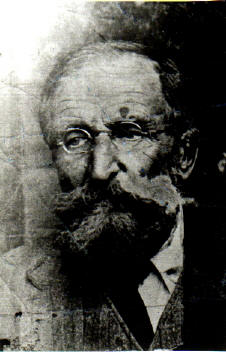National Biography Award nomination
The ‘Cherry Orchard’ on the Atherton Tablelands
[Excerpts]
|
|
|
Nicholas Illin, Courtesy of the Illins family |
The table was smooth, well-planed, and still retained the smell of walnut. Nicholas put a pile of clean paper on it. It was not raining today and through the open window the peaceful evening looked in on his room. Now that the scrub was mostly cleared between his house and the Russell track, it had extended his horizon. It was more than two years since they had chosen the selection. Now it was time to sum up his life. Nicholas decided to do it in the form of a letter to the popular St Petersburg newspaper New Times. His calloused hands that of late were more used to an axe, a saw, and a spade felt awkward with the pen at first. But the habit returned and the first even and accurate lines soon lay on the page...
... He finished the article and went outside. The night sky was clear. Surprisingly for the tropics, it was frost that he was worried about just now. On the Atherton Tablelands, at more than 700 metres above sea level, there are sometimes frosts at night in winter-time. Nicholas went down the path to the place that for him was the heart of the farm, to his sacred ‘cherry orchard’. Cherries did not grow in it, though; instead, it had fruit more suited to this tropical climate: bananas, oranges, pineapples and peaches. But the orchard was exactly that — a Chekhovian one, planted and lovingly cultivated with his own hands to bring people joy rather than profit.
Was it not about him, about the orchard of his childhood in Ilinka, that Chekhov said: ‘Your grandfather, your great-grandfather and all your ancestors owned serfs, they owned human souls. Don’t you see that from every cherry-tree in the orchard, from every leaf and every trunk, men and women are gazing at you? Don’t you hear their voices? ... But if we’re to start living in the present isn’t it abundantly clear that we’ve first got to redeem our past and make a clean break with it? And we can only redeem it by suffering and getting down to some real work for a change.’
Chekhov’s heroes promised: ‘The earth is so wide, so beautiful, so full of wonderful places’. ‘We shall plant a new orchard, more glorious than this one. And when you see it everything will make sense to you.’ Nicholas followed this advice in full, one of few Russians to do so. And now he was looking at his slim, vulnerable peach-tree seedlings and at the lush banana trees and pineapple plants. Fireflies flitted over the trees in their endless dance and strange tropical constellations glittered overhead. Something tore at his heart — how was he to accept this alien world, how might he find a place for his Russian soul in it; and his ideal Russian ‘cherry orchard’, how was he going to create that so far away from Russia, in this country where perhaps no one would dare cut it down, as happened in Chekhov’s play, but where at the same time no one would appreciate it either.
The new moon, slowly rising over the tops of unfelled jungle trees, was greeted by the anxious, piercing call of an owl. Agitated, Nicholas slowly returned to his desk but soon he was himself again and neat lines flowed onto the paper once more.
